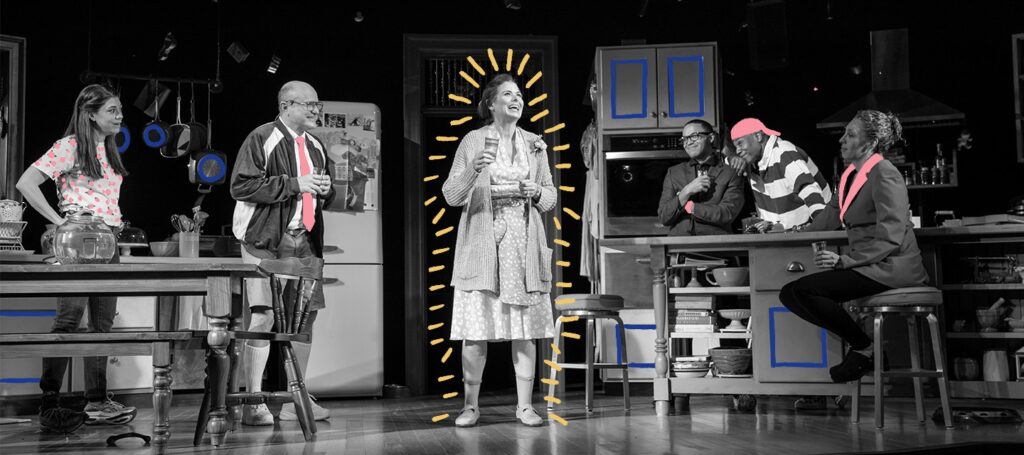


A Recipe for Love is Served in ‘Birthday Candles’
Familiarity often breeds contempt but in Noah Haidle’s Birthday Candles, it also serves as the ingredient of love.
Over the course of the 90 minutes of this tightly calibrated Broadway debut, that love transforms Ernestine (Debra Messing) from a rebellious 17-year-old on the cusp of greatness into a 107-year-old great-grandmother who holds her family together. The play’s constant playground is Ernestine’s beautifully appointed kitchen (designed by Christine Jones, with everyday knick-knacks suspended overhead as if they were stars.)
Haidle has structured Birthday as an allegory that moves forward every few minutes from one birthday to the next, with changes in years demarcated by the tolling of a bell. One minute Ernestine declares that she will not attend prom with her dweeby classmate Kenneth (Enrico Colantoni) or his dreamy counterpart Matt (John Earl Jelks). A few bell tones later, she and Matt are married and dealing with their rebellious teenage son Billy (Christopher Livingston) and snarky daughter Alice (Susannah Flood).
Soon, Billy is experiencing his own comeuppance at the hectoring of his daughter (Crystal Finn), who eviscerates him with the same verbatim retort that he once unleashed upon his parents.
In a clever play on inheritance, successive members of the family are played by the same actors. Billy’s former wife plays their daughter, just as Ernestine’s mother (Susannah Flood) also plays her daughter and great-granddaughter.
Vivienne Benesch directs the play with economy so that aging and scene changes occur immediately with minimal costume changes (letting one’s hair down, or removing a jacket) or the introduction of new characters. Happily, she trusts that the audience will catch onto what is going on without televising too much. Essentially, we are teleporting through time into fights and flights of fancy with no other context than everyone on stage has gathered to celebrate Ernestine and her cake baking.
What begins as a cliched rite of passage―measuring her height and baking a vanilla birthday cake―soon takes on new meaning as familial traditions are adopted or transmitted from one generation to the next. But the act of transmission stops short of informing us who Ernestine truly is. By the play’s end, she feels familiar though still entirely unknown.
Part of that is a construct of the play; Ernestine is an archetype defined by her function as a mother and caretaker whose greatest accomplishment is soothing her brood or smoothing things over. But even after she becomes a successful businesswoman later in life, Ernestine fails to escape the burden of serving others.
Messing might have overcome that limitation by digging deeper into the emotions of the part. Unfortunately, she does not make the connection. Her colleagues have an easier time bringing their myriad characters to life. Like Ernestine, they remain a group of archetypes who assume that they are the architects of their own fates. Though their characters stumble along without a road map for getting from point A to C, the actors all manage to infuse their repeated gestures with poignancy.
But even with Messing’s surface-level engagement and the lack of an exciting plot, by appointing a supporter as Birthday Candles’ heroine, Haidle manages to prove that toiling for one’s daily bread and serving others is often a holy act.
Keep Reading

While Looking at History “Suffs” Elects Didacticism Over Adventurousness
Shaina Taub has spent eight years researching and condensing the adventures of women’s rights activist Alice Paul and her cronies into a manageable tale. Despite the comparatively concise final product, at nearly three hours in runtime, Suffs (shorthand for women who fought to win the right to vote) still feels too long to absorb in […]
Read More
In ‘Take Me Out’ White Agency and Ableism Have a Ball
Imagine a world where a superstar baseball player on par with Derek Jeter decides to disclose that he is gay. In 2003, Richard Greenberg did precisely that with Take Me Out and received the Tony Award for Best Play for his regressive efforts. Almost two decades later, his ableist and gay-caricature-laden affair has returned to […]
Read More












